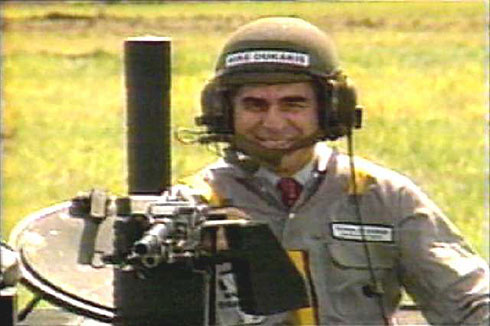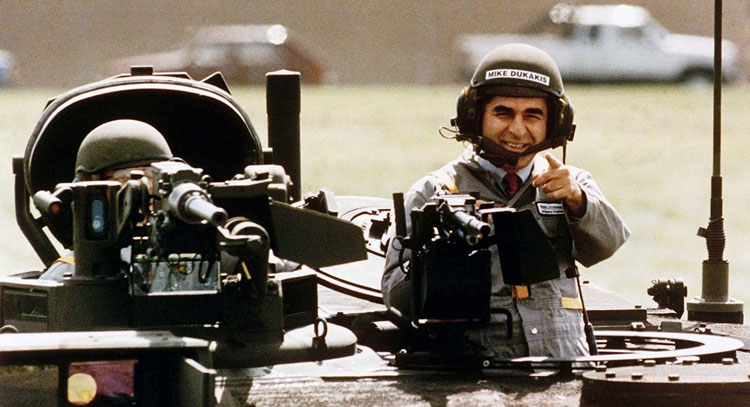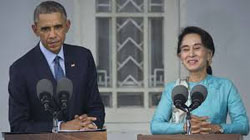
What is the difference between a hockey mom and a pit bull?
Sarah Palin’s single-word answer to her own question—“lipstick”—propelled her from relatively obscure Alaska governor to political superstar. A superstar that fizzled out fast.
Addressing the 2008 Republican national convention as presidential hopeful John McCain’s running mate, Palin was reading from a prepared script.
In the days that followed, she spoke off the cuff and was usually lost for words—intelligible ones.
“What newspapers and magazines do you read?” She replied: “All of ’em, any of ’em”, and cited none by name.
Which Supreme Court decisions could she identify? Only one, the familiar Roe v Wade abortion case.
A word on the tip of her tongue was, she knew, in the region of “refute” and “repudiate” but, locating neither, she compromised with “refudiate”.
“I can see Russia from my house.” Palin was widely ridiculed for this phrase, which she never actually uttered (comedienne Tina Fey did, caricaturing the candidate on the popular television program Saturday Night Live).
“You can actually see Russia from land here in Alaska, from an island in Alaska”, is what she did say. She was correct. But the part of Russia visible from Alaska is a sliver of uninhabited rock. This was geology, not global affairs.
What would she do if British support for American involvement in Iraq wavered? She would talk to the Queen, she replied.
Wrong. The person with the power in the U.K. is the prime minister. The Queen is for having tea with.
This royal miscue occurred behind closed doors, related by John Heilemann and Mark Halperin in Game Change: Obama and the Clintons, McCain and Palin, and the Race of a Lifetime. McCain campaign advisers, worried by Palin’s cluelessness, gave her a crash course in politics. Initially keen, she quickly shed her enthusiasm. And her instructors couldn’t stop her from tossing word salads.
A leaping lepo
Gary Johnson, former governor of New Mexico, ran for president on the Libertarian Party ticket in 2012 and 2016.
During the 2016 campaign, a journalist asked Johnson about Aleppo.
“What is Aleppo”?, he replied.
Aleppo is a city in Syria, a place, not a thing. Maybe he was asking, “What is a lepo?”
His unfamiliarity with the word was especially puzzling given that Aleppo was regularly making headlines due to Syria’s air force bombing it to smithereens.
Despite his flub, Johnson received nearly 4.5 million votes, a negligible one percent of all votes cast, but important in some states, where Donald Trump and Hillary Clinton were running neck and neck.
Was Cain Able?
A question about Syria, not Libya, flummoxed Republican presidential hopeful Herman Cain in 2012: What did he think of President Obama’s handling of Libya?
Cain replied: “I do not agree with the way he handled it for the following reason: Um. Nope! that’s a different one. Let’s see, I’ve got to go back, um, I’ve got all of this stuff twirling around in my head.”
“That’s a different one.”
A different what? His twirling answer suggests that he had studied the issues and memorized answers to many questions, but in the heat of verbal battle his mental index cards got shuffled.
Cain at least had the legitimate excuse that he was not a professional politician. His Master’s Degree was in Computer (not Political) Science, and instead of running for office, he ran businesses such as Godfather’s Pizza, Pillsbury and Burger King. All in all, he did better than many veteran politicians.
Oops!
In a nationally televised Republican debate in 2011, Texas governor Rick Perry cited, for the umpeenth time, the three federal agencies that, as president, he would ditch: “Commerce, Education and the um, what’s the third one there, let’s see.”
Perhaps, fellow debater Mitt Romney suggested, the Environment Protection Agency? Yes. Perry swallowed the bait whole, then admitted that, No, the E.P.A. was not his third agency.
He started again and even consulted his notes before capitulating with the immortal line, “No, the third one, I can’t. Sorry, oops.”
Perry was not nominated, the Department of Energy was not eliminated, and several years later the new president, Donald Trump, appointed Perry to head the Department of _____ (guess; it isn’t Commerce, it isn’t Education, and it isn’t even the E.P.A.).
More Perry gaffes: Hendrik Hertzberg in the New Yorker magazine.
Runs in the Romney Family?
Mitt Romney, seeking the Republican nomination in 2012 to run against sitting President Barack Obama, told a group of supporters at a private meeting that he was not overly worried by “the 47 per cent of Americans who pay no tax, rely on the federal government for support and see themselves as victims.”
After a video emerged of his 47% remark, he admitted that he had stated his view “inelegantly”. He later added, “I said something that’s just completely wrong.”
In 1968 Mitt’s father George ran against Richard Nixon for the 1968 Republican nomination and dropped a whopper, saying that during his visit to Vietnam, American officials gave him “the greatest brainwashing that anybody can get”. Er, no they didn’t, George. And even if they did, wrong word, wrong phrase.
In the Tank
A successful Democrat governor of Massachusetts, Michael Dukakis faced two formidable opponents in the 1988 presidential race: George H. W. Bush and Willy Horton.
George Herbert Walker Bush was Ronald Reagan’s vice president. Willy Horton was a convicted murderer who was given a weekend pass from prison, chose not to return to the slammer after his furlough ended and, while outside, committed armed robbery and rape.
Crime in general and Horton in particular were hot topics at the time, and it was inevitable that a question about capital punishment would arise during the presidential debate. Dukakis’ opposition to capital punishment was well known, and it was vital that he address the topic adroitly.
During the debate, the moderator asked him if he would he still be against the death penalty if someone raped and murdered his wife.
Dukakis and his advisers had prepared a morally and politically astute answer to this very question and, in theory, he was fully prepared to answer it. In practice, he gave an earnest and honest reply—yes, he would still oppose capital punishment in those circumstances—that made him look soft on crime. What happened to his pre-packaged answer? Dukakis later admitted that he did not realize that the question he was asked was the one he and his team had rehearsed.
His ratings plummeted, a decline helped by a photograph of the candidate, wearing shirt, tie and helmet, peering from the turret of a tank. He supplemented his verbal false steps with this dire photographic gaffe.
Mr Potato(e)Head
With George H. W. Bush’s victory over Dukakis, America’s new vice president was not Lloyd Bentsen but Dan Quayle, a veteran congressman and senator who dispensed gaffes on a Palinesque (Sarah, not Michael) scale.
“Republicans understand the importance of the bondage between a mother and child.”
He references to space and time are Einsteinian in their opacity :
- “For NASA, space is still a high priority.”
- “We don’t want to go back to tomorrow, we want to go forward.”
- “The future will be better tomorrow”.
- “It’s time for the human race to enter the solar system”.
During a school visit, a pupil correctly spelled ‘potato’ whereupon the then-Senator Quayle corrected the correct spelling by adding an ‘e’ at the end. The teacher was only a few feet away. So was George H. W. Bush. So were the newsreel cameras.
Nor did he escape notice when he tried to paraphrase the familiar slogan of the United Negro College Fund advertising campaign—“A mind is a terrible thing to waste.”
“You take the United Negro College Fund model that what a waste it is to lose one’s mind or not to have a mind is being very wasteful. How true that is.” Indeed.
No Beating Behind the Bushes
Bush the father was a good public speaker; not so the son, George Walker Bush, who made up new words like ‘subliminable,’ claimed that people ‘misunderestimated’ him, and warned that “We cannot let terrorists and rogue nations hold this nation hostile or hold our allies hostile.”

Barack Obama, successor to Bush 43, was too polished and articulate to succumb to neologisms and malapropisms but even he did not always get it right. On a visit to Burma, he fell foul of the ancient Burmese tradition, when in Burma, pronounce the leader’s name correctly. His tongue got twisted when, in her presence, he tried to say Aung San Suu Kyi.
A greater verbal mishap was his warning to Syria that the use of chemical weapons would be a “red line”. When Syria did employ chemical weapons, he failed to act or react in any meaningful manner. Instead, Obama humiliatingly got off the pot. He had given himself no wiggle room, cornered by a phrase that, morally laudable when he delivered it, proved to be too clear, direct and uncompromising. ###
British politicians do not make these kinds of gaffes (they have their own variety). We take a look at them in this blog.
